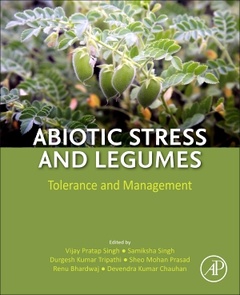Abiotic Stress and Legumes Tolerance and Management
Coordonnateurs : Singh Vijay Pratap, Singh Samiksha, Tripathi Durgesh Kumar, Prasad Sheo Mohan, Bhardwaj Renu, Chauhan Devendra Kumar

Abiotic Stress and Legumes: Tolerance and Management is the first book to focus on the ability of legume plants to adapt effectively to environmental challenges. Using the -omic approach, this book takes a targeted approach to understanding the methods and means of ensuring survival and maximizing the productivity of the legume plant by improving tolerance to environmental /abiotic stress factors including drought, temperature change, and other challenges.The book presents a comprehensive overview of the progress that has been made in identifying means of managing abiotic stress effects, specifically in legumes, including the development of several varieties which exhibit tolerance through high yield using transcriptomic, proteomic, metabolomic and ionomic approaches. Further, exogenous application of various stimulants such as plant hormones, nutrients, sugars, and polyamines has emerged as an alternative strategy to improve productivity under these environmental challenges.Abiotic Stress and Legumes: Tolerance and Management examines these emerging strategies and serves as an important resource for researchers, academicians and scientists, enhancing their knowledge and aiding further research.
1. Exploiting the potential of Plant Growth Promoting Rhizobacteria in Legume Production
2. Nod factor signaling in legume-Rhizobium symbiosis: specificity and molecular genetics of nod factor signaling
3. The Importance of Plant Growth Promoting Rhizobacteria for Plant Productivity
4. Modulations of legume plants in response to heavy metals induced stress
5. Role of sugars in mediating abiotic stress tolerance in legumes
6. Circadian regulation of abiotic stress tolerance in legumes
7. Polyamines: A Promising Strategy for Imparting Salinity Stress Tolerance in Legumes
8. PHYTOHORMONAL SIGNALING UNDER ABIOTIC STRESS IN LEGUMES
9. Unsnarling the Role of Melatonin as Abiotic Stress Managers in Legumes
10. Role of ROS in the regulation of Abiotic Stress tolerance in Legumes
11. Role of Metabolites in Abiotic Stress Tolerance in Legumes
12. Quorum sensing signaling molecules and their inhibitors in legume-associated bacteria
13. Plant Genes for Abiotic Stress in Legumes
14. MicroRNAs and Abiotic Stress Tolerance in Legumes
15. QTL mapping for abiotic stress in legumes
16. Genetic Engineering of Legumes for Abiotic Stress Tolerance
Researchers, Scientists Academicians, Agriculture industries, Universities Central research institutions
Vijay Pratap Singh is an Assistant Professor, Department of Botany C.M.P. Post Graduate College, University of Allahabad, India. Dr. Singh has obtained his D.Phil. degree from University of Allahabad. He has authored 95 publications including book chapters and editorials in reputed journals. He has edited several books with Elsevier, Wiley, CRC Press, Nova Publisher, Studium Press, etc. His area of research interest is regulation of abiotic stress in plants with special emphasis on nitric oxide, hydrogen sulfide, reactive oxygen species and phytohormonal signaling. Dr. Singh is also working as an editor and reviewer of reputed international journals.
Samiksha Singh is working as a D.Phil. research scholar in Department of Botany, University of Allahabad, Allahabad, India. She has obtained her M.Sc. degree in Environmental Science from Lucknow University. Her area of research interest is management of abiotic stress in plants using biochemical and molecular approach.
Samiksha Singh is a Junior Research Fellow in the Plant Physiology and Biochemistry Laboratory, Department of Botany, University of Allahabad, India. Her area of research interest is management of metal stress in plants using biochemical and molecular approach with emphasis on nitric oxide and hydrogen sulfide signaling. She has authored 33 publications in reputed international journals. She has edited books with Wiley, Nova Science Publisher, Studium Press and others.
Dr. Durgesh Kumar Tripathi is
- Explores the progress made in managing abiotic stress, specifically with high yield legumes
- Highlights the molecular mechanisms related to acclimation
- Presents proven strategies and emerging approaches to guide additional research
Date de parution : 08-2021
Ouvrage de 422 p.
19x23.3 cm
Thèmes d’Abiotic Stress and Legumes :
Mots-clés :
transcriptomics; proteomics; metabolomics; ionomic; plant hormones; nutrients; sugars; polyamines



